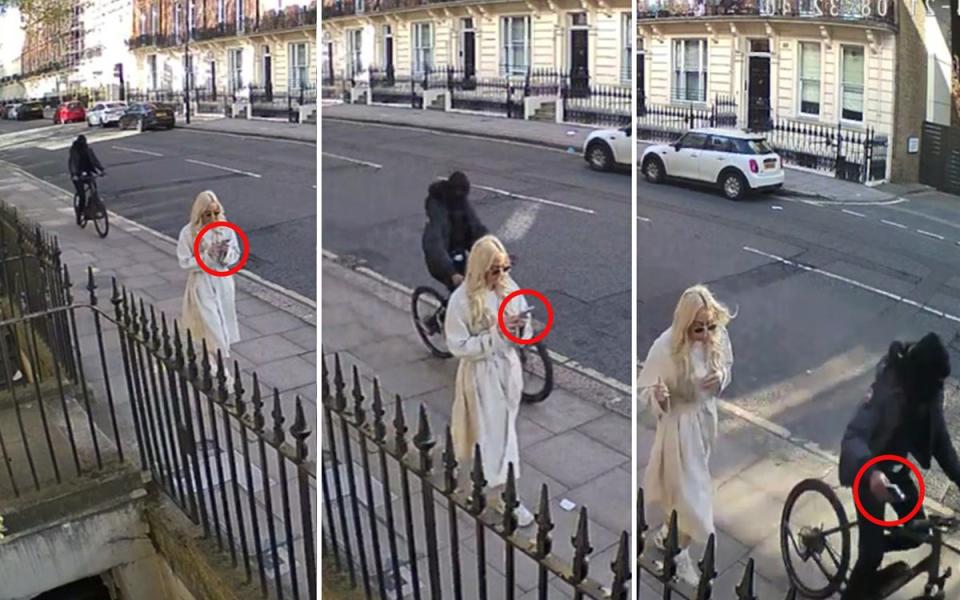Weapon-wielding thugs using e-bikes and mopeds who robbed London were called out on Friday, as the capital’s Victims’ Commissioner warned of the trauma the crime spree is inflicting on the community.
Claire Waxman said muggings were leaving victims suffering from long-term trauma and causing fear in public spaces and could have a “serious impact on a person’s sense of safety”.
The threat was brought into sharp focus earlier this week when a prolific mugger riding a high-speed e-bike was brought to justice. Sonny Stringer, 28, from Islington, took mobile phones from 24 people in a day-long crime spree across central London.
He was caught when the police made a “tactical contact” with the rear wheel of his bike and hit him.
The Government’s police minister, Chris Philp, echoed Ms Waxman’s call as he warned that phone muggings in the capital were “far too high” despite a decline in such offending elsewhere in the country.
Mr Philp, who has already met tech giant Apple to press him to make it easier to track down and disable stolen phones, said he wanted the Met to “declare war on this type of crime “.
Scotland Yard sources said the Met Commissioner, Sir Mark Rowley, wanted phone manufacturers to thwart the muggers, often wearing masks, by installing “kill switches” which would enable mobile phones to be disabled as well as soon as a theft is reported.

Sir Mark met the tech giants in the autumn with London Mayor Sadiq Khan to press for action and is understood to be disappointed at the slow pace of progress. He believes the phone companies could go further and faster in “designing out” the crime.
However, the focus on Friday was on the plight of the victims following a series of violent and distressing muggings by knife-wielding robbers on two wheels in the capital.
Recent incidents include the one featured on our front page today where a balaclava-clad robber on an e-bike pulled over the curb in Albany Street, Marylebone, and stole a woman’s mobile phone from her hands.
A student who tried to help said: “She was a tourist from America and she was in distress. She was in shock and had lost everything on her phone… It’s not a good look for London.”
In another attack, two muggers on e-bikes were seen on CCTV riding side by side along Oxford Street before one of them targeted a couple at a bus stop, grabbing phones before both bikes and their riders stopped.


Ms Waxman said that crimes like this were causing great distress to victims as well as putting their safety at risk and that more action was needed to address the problem.
“Robberies are not only an inconvenience to their victims, but can have a serious impact on a person’s sense of safety, causing shock and fear in public spaces,” she said.
“When violence is involved, the impact can be even deeper and longer lasting. If not dealt with properly, it will affect victims’ and the public’s trust and confidence in the police.”
Mr Philp said solutions included more hotspot policing in areas targeted by robbers, as well as the use of facial recognition to track offenders and changes by the tech giants to make it easier to disable stolen phones.
“Mobile phone theft in London is far too high which is why we are asking police to follow all lines of inquiry to catch the crimes, including running CCTV of the perpetrators through the facial recognition database at all times . I also wish phone manufacturers, especially Apple, would do more to make these phones unusable after theft.”
How to beat the muggers
* Be aware of your surroundings and only use your mobile phone when it feels safe.
* When you’re done, put it away.
* Use your phone’s security features to stop someone from using your phone if it’s stolen. Choose a strong PIN, passcode or password.
* Get your phone’s IMEI number by typing *#06# on your phone’s keypad. The IMEI can help track the phone down.
* Set up a tracking app so you can see where it is from another device. Use it quickly, before thieves have a chance to disable it.
* Turn off message previews, so thieves don’t see any messages about reset codes.
Mr Philp said: “While mobile phone theft has fallen by 70 per cent across the country since 2010, in London there is much more to be done. I want the police to declare war on this.”
The renewed concern about mobile phone muggers operating on bikes and mopeds continues efforts to tackle the problem and a series of arrests and convictions. Despite these efforts, the latest figures from the Office for National Statistics show a 34 per cent rise in knifepoint robberies in London last year.
The total of 8,956 offenses recorded includes muggings by offenders on two wheels which was an increase of 2,248 additional offenses compared to the previous 12 months and an average of 25 muggings per day.
Other statistics presented by the Met Commissioner to the London Police Board in March show that overall robbery has increased by 20 per cent, but the success rate in detecting criminals has fallen to just 5.7 per cent. That was lower than the already low figure of 7.9 per cent recorded a year earlier and means more than nine out of 10 muggings are going unsolved.
Moped thugs stole 72 phones in six weeks
A pair of moped-riding thugs who stole 72 phones from London in a six-week crime spree have been jailed after CCTV evidence helped police hunt them down.
Randy Kavungu, 21, and Darius James, 22, ambushed lone commuters on their way to work in London. They drove up to the victims, grabbing the devices from their hands before driving away, often driving at dangerous speeds. A video shown in court showed the level of violence used by the robbers.
On one occasion, the robbers threw coffee in the face of their victim, and another victim broke his finger, and one witness was threatened with a hammer. The thieves covered the number plate of the moped before launching their attacks in late May and June last year. One would steer the bike while the other grabbed the phones from their position riding on a pillion.
Kavungu and James, who admitted robbery as well as other offences, were jailed for four-and-a-half years at Hendon magistrates’ court in January.
Scotland Yard said that despite such statistics, robbery and violent crime were a priority for the Met and intensive efforts were being made to tackle mobile muggers. A spokesman added: “The Met is also working with phone networks, and businesses in hotspots to break the cycle of stolen mobile phones entering criminal markets. We know that opportunistic criminals target high traffic and tourist areas, such as Westminster and Soho.
“To combat robberies, we have specialist teams of uniformed officers and detectives who respond quickly to robbery calls, search the area with victims and witnesses for suspects, and assist with obtaining CCTV and forensic evidence.”
Examples of success highlighted by the force include the conviction of a 17-year-old, who cannot be named for legal reasons, who was caught in possession of stolen mobile phone items including tin foil, gloves grippy and SIM card removal tools.
He was given a youth rehabilitation order and given 60 hours of unpaid work. The force also shows a reduction in phone robberies with 828 such offenses reported during 2023, 102 less than the previous year. However, that equates to an average of more than two telephone muggings per day.
Apple has been contacted for comment.
A young Brazilian woman whose phone was ripped from her hand leaving work in the City said she no longer felt safe in the capital, which she fears is becoming as crime-ridden as her home country.
Cleaner Hilda Mattos, 22, had just left an office in Finsbury Square at 7.50pm on April 16 when a thug on an e-bike approached her and knocked her mobile phone out of her hand.
The theft was the second close to the building in a few days, reflecting a trend of thieves targeting commuters on their way to and from work.
Miss Mattos told the Standard: “I was walking with a friend and the thief went on an e-bike. I was not talking on the phone but holding it in my hand. Suddenly the thief came up and grabbed my hand really hard. It was so fast that I didn’t have time to react to try to stop the phone from getting.


“I am shocked and upset. In London you expect the freedom to walk the streets safely. London is becoming the same as Brazil with the number of thieves on the streets. This sort of thing now happens to workers like me every day in London.”
She said she tried to track his phone through an app but it was turned off and there was no trace.
Ms Mattos, who has been in London for a year and lives in the Whitechapel area, said: “We have everything on our phones. My Travel Card was there and I had to borrow my friend’s card to get home. I’m also more afraid of the streets of London now.
“It was so quick and I’m amazed it could happen here.” Managers at the building where she worked as an agency cleaner issued a warning to all staff to be vigilant when she arrived and left work.